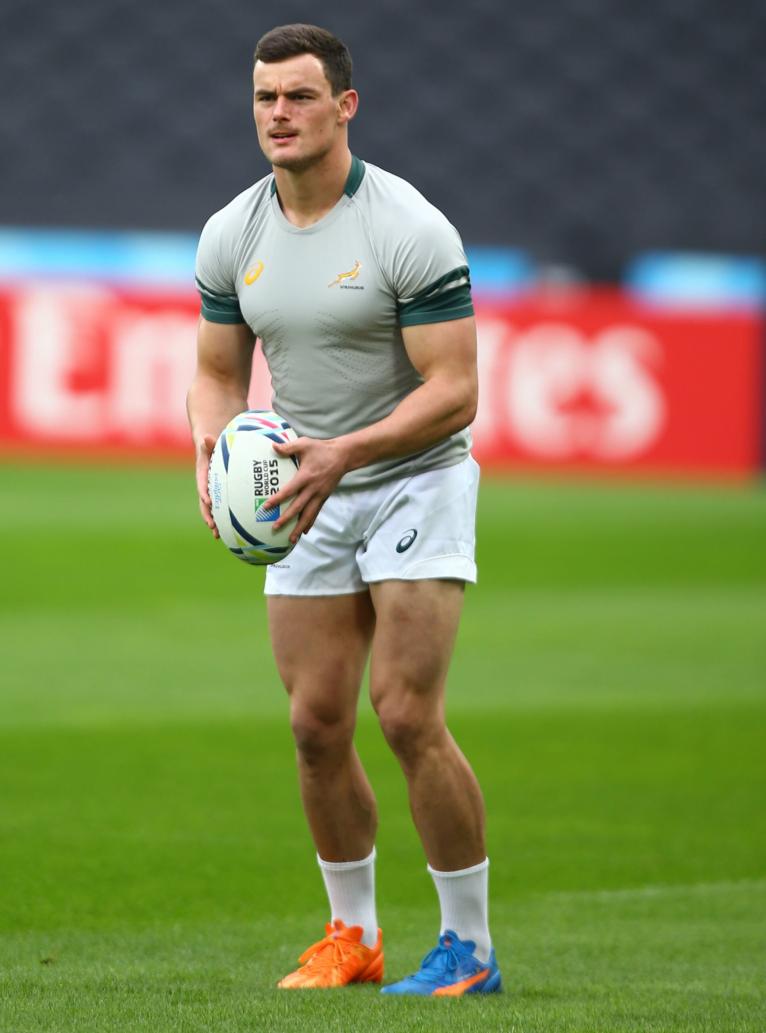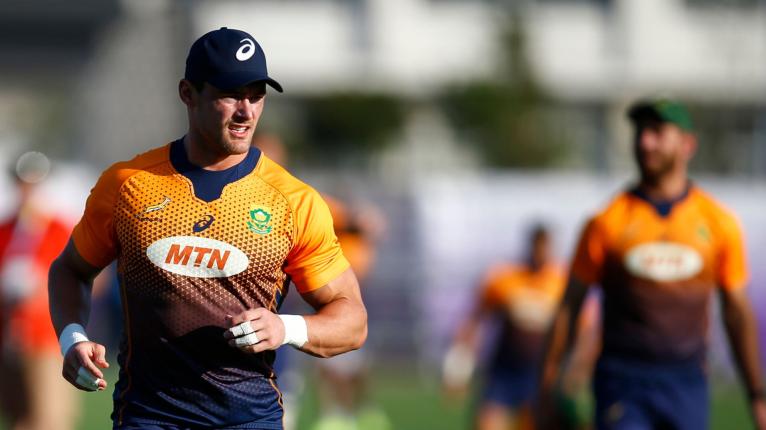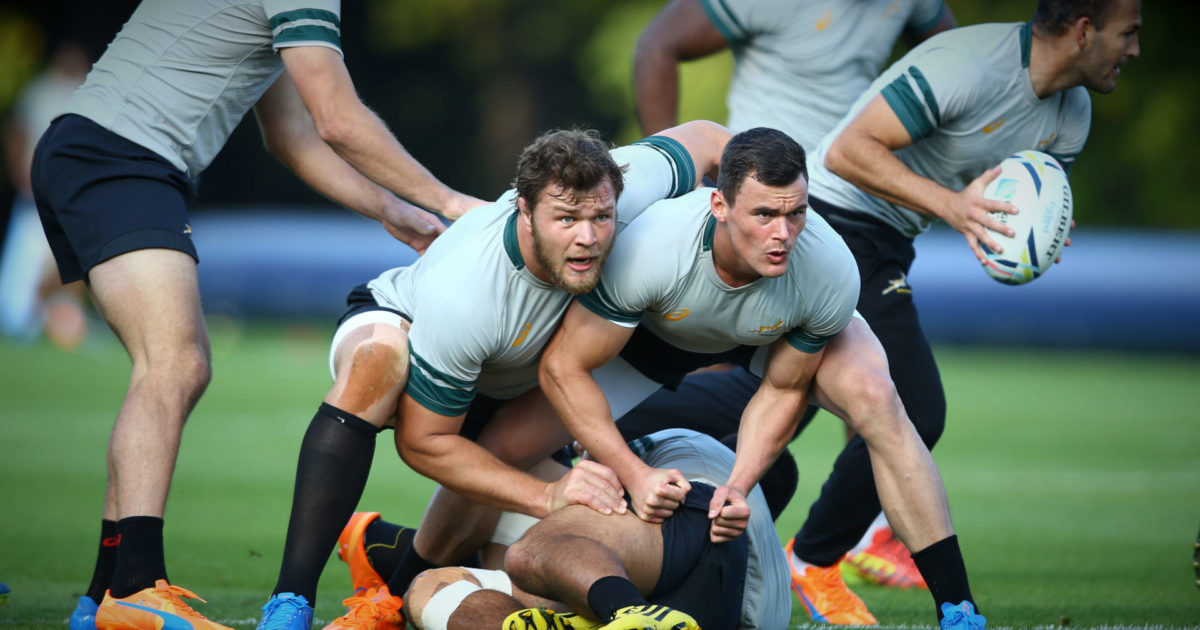'The worst thing you can do is become a victim because to be honest, no-one cares'

As a pupil back at Maritzburg College, Jesse Kriel would sneak into the gym at night, keeping the lights off to avoid alerting any staff, and eke out a few precious hours of lifting that would give him the edge over his peers and rivals. Judging by his physique and the patchwork striations that bind it together, it was around this time that he last consumed any simple carbohydrates.
These were twilight sweat-fests that speak to Kriel’s mind-set. The centre’s whole rugby life has been about outworking and outfighting everyone else, visiting the dark places where only the toughest and most driven dare to venture.
“One of my best mates at school, his dad was the deputy headmaster,” Kriel tells RugbyPass. “So Tim always had a key for the gym.
“I got the key off him, got another one cut for myself that I would use to get in the gym in the evenings – not with the lights on or you’d get bust – just to go through my rugby sessions and get the extra work in.
“There used to be tackle bags in the gym, I did a bit of tackle technique, speed work, hurdles, lifting. It was something that I loved and I knew would make my rugby better.”
Even now, as a World Cup winner restricted by the Covid-19 lockdown, this narrative remains constant. Kriel made it back to South Africa from his Japanese club just in time to avoid being trapped overseas by the spreading pandemic, a fate that met several of his fellow Springboks.
He is based on his partner’s farm near the little town of Hibberdene on the southeast coast. He has his girlfriend and her family help him practice his passing, and goes tramping around the property on a variety of tortuous running sessions. The complex suspension of rugby has given him the breathing space to tear apart his game and zero in on the areas where he feels it is lacking.
“In situations like this, you either become a victim and say, ‘I can’t do this, I don’t have a gym to do that’, or you take it by the scruff and take advantage of the opportunities,” Kriel says.
“I’ve stripped my game down: how can I get better? How can I structure my day to get my skills and conditioning better, and ultimately transfer it on to the field?
“A big thing I’ve been working on is identifying space better, whether it’s kick space, bridge balls over the top to get full-backs and wingers into space, seeing space and exploiting it better. I’ve been watching a lot of Willie le Roux’s clips and talking to him to learn how he does it. He’s one of the best in the world at it – I want to be able to spot that space better and use my skillset that I’m working on to get the ball there.”
The World Cup was a blend of emotions, the exaltation and the glory tempered by the ache of injury. Kriel damaged his hamstring in the opening pool match against New Zealand and flew home to recover.
His focus in these brutal moments was extraordinarily precise, almost machine-like. There was no melancholy, no wallowing in misfortune. As soon as he boarded the airport shuttle, his brain had switched to the next task and the job of getting fit enough to fire back in amongst it should any other backs go down.
“I could control getting back into shape, putting all my energy into rehab and knowing that I could get back out there if someone got injured,” he says.

“The worst thing you can do is become a victim and feel sorry for yourself because to be honest, no-one cares. Unfortunately it didn’t all work out, but I can honestly say I have got absolutely no regrets and I did everything possible to get back in shape and back to full fitness.
“Every night I go to bed a happy guy, we won the World Cup and we achieved our goal. Whether I played or not, that doesn’t matter, that’s irrelevant.”
Ultimately, Rassie Erasmus didn’t need him. His hamstring was too badly damaged in any event if the Bok coach had. But thanks to an act of remarkable philanthropy from Gavin Varejes, a huge supporter and benefactor of South African rugby, the stricken Kriel and prop Trevor Nyakane could fly back to be with their team-mates for the final.
Of course, they lusted to get on the park, but they were as feverish with excitement as anyone in Yokohama as the Springboks atomised England on that sweltering evening.
“I don’t think there was budget to fly us back, and Gavin stepped up and sorted everything – we just needed to get to the airport,” Kriel says. “He’s an amazing guy who does a lot for South African rugby and I am so grateful to him.
“Being on the field in the warm-up, the atmosphere in that stadium was stupid, crazy. I was so grateful to be there but at the same time, you just wanted to be out there. All the non-playing reserves and injured players, everyone wanted to be playing.
“But our next-best thing was to be the best supporters and energy-givers in that stadium. I loved every second. The highlight for me was defending our line for literally two minutes, we smashed England back. That showed what we are and why we are world champions. That was the character that people speak about in champion teams – that was awesome.”
Kriel sizzles with enthusiasm when he talks about Erasmus and what he did for a beleaguered squad that had become serial losers under the previous regime. He lionises Jacques Nienaber, the defence specialist who has taken over as head coach – “Jacques gets up to work at about 4am… he lives, eats and craps defence” – and Felix Jones, the former Munster back credited with the sprinkling of ingenious technical gems.
“Rassie always talked about how he’ll pick a person first before he picks a rugby player,” Kriel says. “Not many people get it right, but he and Jacques do.

“The group had a common goal, guys bought into their plan and worked absolutely crazy hard. There were no egos, and when you’ve got that, your sky becomes the limit.
“Coaches are there to help you with getting your skillsets under pressure and your conditioning better, but effort is between you and you. Only you can determine how hard you want to work, how quickly you get off the ground.”
Of course, Kriel knew the triumph would reverberate across South Africa, a complex nation where abject poverty and division still exist. But it wasn’t until he made it back to Hibberdene that he got a very tangible and humbling feel of what it meant.
There, he was besieged by the children of the farm workers, interrogated about Siya Kolisi, the Boks’ first black captain who came from a township and reached the very pinnacle of the sport, and lobbied for jerseys, boots and balls.
Credit: Die Hard Rugby
“There’s a whole load of guys working on farms here who don’t come from the luckiest or best background,” Kriel says. “But when I got back, these guys had started to run. They are training. Half of them have got my old kit. They’re asking about Siya Kolisi, the little kids on the farm are asking me if they can have a rugby ball because they want to start practicing.
“They might not even have known what rugby was a couple of years ago, but now it’s become an obsession. Guys are getting opportunities they might never have got before, and maybe one day they will become a Siya or a Handre Pollard. That’s exciting and gives our country a lot of hope.”
When the world wrests itself from the grip of coronavirus, Kriel will return to Japan, where he has revelled in the lifestyle and the rugby in the colours of Tokyo’s Canon Eagles.
There are those who would not have him in a Bok jersey while playing in the Top League, not when clips emerge of RG Snyman smashing through Japanese like a grizzly bear scuttling a gang of squirrels, not with a monumental Lions series looming in 2021.
RG Snyman was quite a handful at kickoff time for the @hondaheat in their Top League clash with @Kubota_Spears. ? FULL ROUND 2 HIGHLIGHTS ON https://t.co/uii6ViVtGY NOW? #TopLeague pic.twitter.com/LVZ8g5Ub7Q
— RugbyPass (@RugbyPass) January 20, 2020
“That’s where people get it wrong,” he says. “If you look at a guy like Duane Vermeulen, he’s been playing in Japan for years, he comes back and he’s at his best for the Springboks.
“That perception and those people are completely wrong. The Top League is really competitive, the rugby is crazy-fast, and the clubs look after you.
“I’ve still got another season there, I’m really excited to get back and play in the Top League. I wouldn’t mind playing for longer over there. My head is only there at the moment, and hopefully I’ll be a part of the Lions series if that all works out. I haven’t thought further ahead than that.”
For now, it’s back to the farm, back to the grind, back to the lust for improvement. He wouldn’t have it any other way.

























